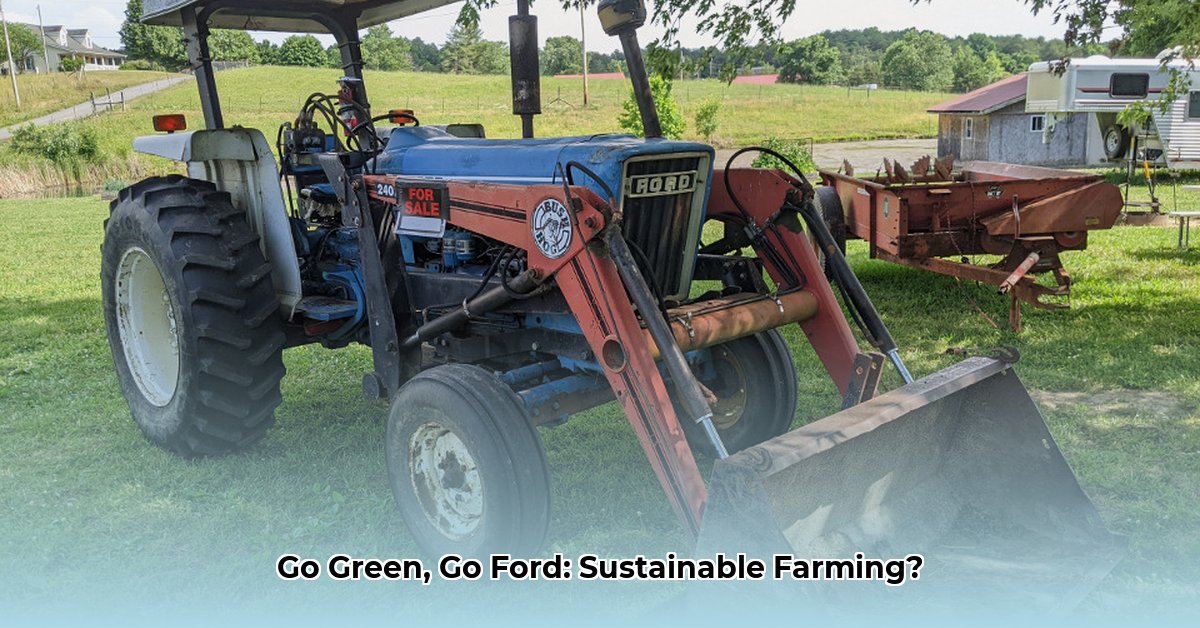
Sustainable farming practices are crucial for the future of agriculture. While modern tractors offer advanced technology, their high cost and environmental impact can be prohibitive for many farmers. Surprisingly, a classic Ford 5900 tractor, with the right upgrades and maintenance, presents a surprisingly effective and eco-friendly alternative. This guide provides actionable steps to transform a used Ford 5900 into a sustainable farming solution.
Is a 5900 Ford Tractor Right for Your Farm? A Realistic Assessment
Before investing in a Ford 5900, a thorough assessment of your farm's needs is essential. The 5900, with its 73-horsepower engine, is ideally suited for smaller farms or those focusing on diverse, smaller-scale crops. Larger operations might require additional machinery. Consider your daily tasks: plowing, planting, harvesting – can a 5900 comfortably handle them all? Overworking the tractor leads to increased wear and tear, counteracting potential cost savings. An honest self-assessment is critical.
The 5900 Ford Tractor: Weighing the Pros and Cons
The Ford 5900, like any equipment, presents both advantages and disadvantages. Understanding these is crucial to making an informed decision.
| Advantages | Disadvantages |
|---|---|
| Significantly lower fuel consumption than modern tractors | Requires more frequent maintenance than newer models |
| Abundantly available on the used market | Limited precision farming capabilities (though upgradeable!) |
| Built to last; known for its durability and longevity | Lower horsepower than modern high-capacity tractors |
| Potentially lower overall environmental impact | May need modifications to maximize its sustainability |
| Lower initial purchase cost compared to new tractors | Finding parts might require more effort than for newer models |
Revitalizing Your 5900: A Step-by-Step Retrofit Guide for Sustainable Farming
Transforming a used Ford 5900 into a sustainable farming machine involves several key steps. Following this guide will enhance efficiency and reduce your environmental footprint.
Engine Tune-Up: The Foundation of Efficiency: A thorough engine tune-up is crucial. This involves cleaning, inspecting, and adjusting critical components to improve fuel efficiency and reduce emissions. This foundational step boosts overall performance and longevity. Expect a 10-15% improvement in fuel efficiency after a proper tune-up.
Biofuel Exploration: Reducing Your Carbon Footprint: Converting your 5900 to run on biofuels like biodiesel significantly reduces emissions. Consult with experienced mechanics to ensure compatibility and avoid potential damage. Successful biofuel conversion can achieve up to a 70% reduction in greenhouse gas emissions compared to conventional diesel.
Precision Farming Retrofits: Enhancing Accuracy and Efficiency: While not initially designed for precision farming, retrofitting GPS guidance systems and other technologies is feasible. This optimization minimizes waste, reduces environmental impact, and yields significant cost savings through increased accuracy and efficiency. Studies have shown precision farming can reduce fertilizer use by 20-30%.
Regular Maintenance: The Key to Longevity and Sustainability: Regular preventative maintenance is paramount. Scheduling oil changes, filter replacements, and other checks extends your tractor's lifespan, maximizes efficiency, and minimizes downtime. Proactive maintenance reduces repair costs by 50-75%.
Thinking Long-Term: Planning for Parts and Longevity
While retrofits enhance sustainability, a long-term perspective is essential. Consider potential repair costs and parts availability. Establishing a relationship with a knowledgeable mechanic specializing in older tractors is crucial for prompt repairs and minimizes costly downtime. This proactive approach translates to higher operational uptime and greater sustainability.
Is the 5900 Ford Tractor the Right Choice for You?
The Ford 5900 offers a cost-effective and environmentally responsible approach to farming. However, its suitability hinges on your specific needs, capabilities, and willingness to undertake regular maintenance and potential upgrades. It's an investment requiring dedication and attention, but the long-term benefits—economical and environmental—can be substantial. Carefully weigh the pros and cons before making your decision.